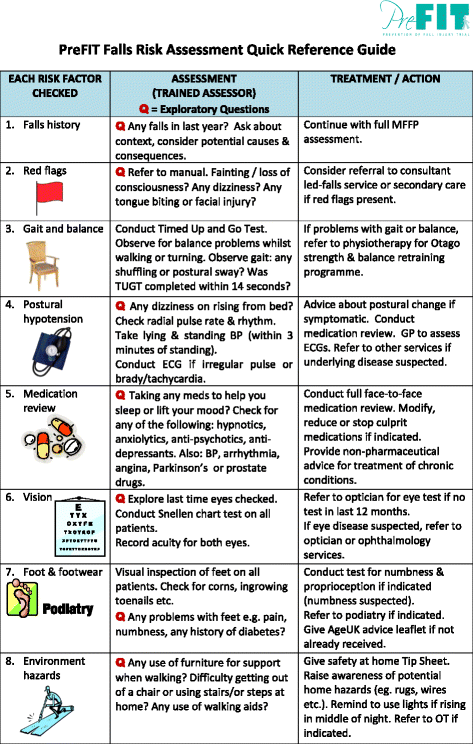Dementia Fall Risk Fundamentals Explained
Dementia Fall Risk Fundamentals Explained
Blog Article
The 9-Second Trick For Dementia Fall Risk
Table of ContentsDementia Fall Risk for DummiesThe 7-Second Trick For Dementia Fall RiskNot known Facts About Dementia Fall RiskNot known Incorrect Statements About Dementia Fall Risk The Best Guide To Dementia Fall Risk
You might be anxious because you have actually had an autumn prior to or since you've observed you're beginning to feel unsteady on your feet. You might have discovered modifications to your health and wellness, or simply seem like you're decreasing a little. Whatever the reason, it isn't unusual to become mindful and shed confidence, and this can stop you doing things you utilized to do and make you really feel a lot more separated.If you have actually had a fall or you've started to feel unsteady, inform your medical professional also if you feel fine or else. Your medical professional can examine your equilibrium and the means you stroll to see if improvements can be made. They might be able to refer you for a drops danger evaluation or to the drops avoidance service.
This details can be gotten with interviews with the individual, their caretakers, and an evaluation of their medical records. Begin by asking the private regarding their history of falls, including the frequency and situations of any type of recent drops. Dementia Fall Risk. Ask about any kind of movement problems they may experience, such as unsteady or difficulty walking
Conduct a comprehensive review of the individual's drugs, paying certain attention to those known to enhance the danger of falls, such as sedatives or medications that lower high blood pressure. Determine if they are taking several medications or if there have been current adjustments in their medicine routine. Examine the individual's home setting for prospective hazards that can boost the danger of drops, such as bad lights, loosened rugs, or lack of grab bars in the bathroom.
The Basic Principles Of Dementia Fall Risk
Guide the individual via the autumn threat evaluation kind, describing each inquiry and tape-recording their actions properly. Calculate the total danger score based on the actions provided in the assessment kind.
This plan might consist of workout programs to improve strength and balance, medication changes, home modifications, and references to other experts as needed. On a regular basis check the individual's progress and reassess their threat of drops as needed. Modify the treatment strategy based on modifications in their wellness status or home environment. Provide recurring education and learning and support to advertise safety and lower the danger of falls in their day-to-day living activities.
Many studies have shown that physical therapy can aid to reduce the risk of dropping in grownups ages 65 and older. In a new research study (that took a look at drops threat in ladies ages 80 and older), researchers determined the economic impact of choosing physical therapy to stop drops, and they discovered that doing so saves $2,144, consisting of all the covert prices of your time, discomfort, missed out on life events, and the dollars spent for solutions.
A Biased View of Dementia Fall Risk
Checking your heart price and high blood pressure dimensions at rest and while you turn (from sitting or lying to standing). An easy test of your thinking (cognitive) capabilities. Evaluating your balance, toughness, and strolling capability. A basic vision examination. Assessing your feet and footwear. A home security analysis. Based upon the examination results, your physiotherapist will certainly make a strategy that is customized to your certain requirements.
Older grownups that have trouble walking and talking at the very same time are at a greater risk of dropping. Dementia Fall Risk. To aid raise your safety throughout daily see this site activities, your physical therapist might design a training program that will certainly challenge you to keep standing and strolling while you do an additional job. Examples consist of walking or standing while counting backward, having a conversation, or bring a bag of grocery stores
Establish goals for raising their physical task. Exercise a lot more to boost their toughness and equilibrium. These programs commonly are led by volunteer trainers.
Facts About Dementia Fall Risk Uncovered

Measles, or rubeola, is a highly infectious, severe viral infectious condition caused by the measles virus. Some individuals think of measles as just a rash and high temperature that improves in a few days; however, measles can trigger serious health problems, especially in youngsters more youthful than 5-years-old. The very best defense against measles is the measles, mumps, and rubella (MMR) injection.
Autumns are an usual reason for injury amongst older adults. According to the CDC, in one year alone, fall-related injuries added to over $50 billion in medical prices (Dementia Fall Risk). In hospital setups, older grownups are at specifically high risk of falls due to the fact that their lowered wheelchair from being confined to a room or bed.
The Best Strategy To Use For Dementia Fall Risk

She has no history of drops, her stride is constant, and she voids with no problems. her response The previous registered nurse states that she calls for aid to the washroom when she requires to go.
Instances of common autumn interventions/measures include: Ensuring an individual's vital things are available. Putting the client's bed rails up with the alarm system on. Helping a person while they're rising from bed. Past recognizing just how to use the Johns Hopkins Fall Risk Evaluation Tool, it's essential that facilities incorporate its usage into an extra comprehensive fall prevention plan.
Report this page